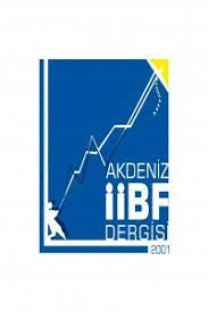Araştırmacıların ve lisans öğrencilerinin görüşleri ışığında e-devlet eğitiminde güncel gelişmeler
Contemporary developments in e-government education in the light of opinions of researchers and undergraduate students
___
- AUGUSTINAITIS, A., & PETRAUSKAS, R. (2004). Master Studies on e- Governance Administration:The First Experience in Lithuania.
- EGOV 2004(3183), 438-445. (R. Traunmüller, Derleyici) Heidelberg: Springer LNCS.
- BABAOĞLU, C., DEMIRCIOĞLU, M.A. (2012). Türkiye’deki Kamu Yönetimi Bölümleri Müfredatında E-Devlet Derslerinin Durumu. M.Z. Sobacı, M. Yıldız içinde, E-Devlet Kamu Yönetimi ve Teknoloji İlişkisinde Güncel Gelişmeler (s. 129-150). Ankara:Nobel.
- BENSGHIR, T. K., & YILDIZ, M. (2003). The Influence of Information Technology on Turkish Public Administration Curricula. ASPA (Dü.), 26th Teaching Public Administration Conference. Dayton, Ohio.
- BIASOTTI, M. A., & NANUCCI, R. (2004). Teaching e-Government in Italy. Springer LNCS(3183), 460-463. (R. Traunmüller, Dü.) Heidelberg: Springer.
- CHIU, S. C. (2007). Understanding the Adoption and Diffusion of Information Related Curricula:Multiple Theoretical Perspectives. Doktora Tezi. Indiana University.
- ÇUKURÇAYIR, M. A., & ÇELEBI, E. (2009). Bilgi Toplumu ve E- Devletleşme Sürecinde Türkiye. ZKÜ Sosyal Bilimler Dergisi, 5(9), 59- 82.
- DAWES, S. S. (2004). Training the IT-Savvy Public Manager: Priorities and Strategies for Public Management Education. Journal of Public Affairs Education, 10(1), 5-17.
- DPT. (2011). Bilgi Toplumu İstatistikleri 2011. Ankara: DPT Bilgi Toplumu Dairesi Başkanlığı.
- EUROPEAN COMMISION. (2012). Factsheets. epractice.eu: http://www.epractice.eu/files/eGovernmentTurkey.pdf adresinden alınmıştır
- EUROSTAT. (2012). Eurostat/Information Society. Eurostat: http://epp.eurostat.ec.europa.eu/portal/page/portal/information_ society/data/main_tables adresinden alınmıştır
- FOUNTAIN, J. (2001). Building the Virtual State. Washington: Brookings Institution Press.
- GARSON, D. (2006). Public Information Technology and E-Governance: Managing the Virtual State . NC: Jones and Bartlett Pub.
- GAULD, R., GOLDFINCH, S., & HORSBURGH, S. (2010). Do They Want It? Do They Use It? The "Demand-Side" of e-Government in Australia and New Zealand. Government Information Quarterly, 27(2), s. 177-186.
- HEEKS, R. (2003). Most E-government for Development Projects Fail: How Can Risks Be Reduced? Manchester: Institute for Development Policy and Management, University of Manchester.
- İÇIŞLERI BAKANLIĞI MAHALLI İDARELER GENEL MÜDÜRLÜĞÜ. (2011). e-Devlet (Yerel) Uygulamaları Anketi Raporlaması. Ankara: Mahalli İdareler Genel Müdürlüğü.
- KALKINMA BAKANLIĞI BILGI TOPLUMU DAIRESI. (2012). Bilgi Toplumu Tarihçesi. Kalkınma Bakanlığı Bilgi Toplumu Dairesi Web Sitesi: http://www.bilgitoplumu.gov.tr adresinden alınmıştır
- KARKIN, N., & ÇAYHAN, H. S. (2011). Vilayet ve İl Özel İdareWeb Sitelerinde E-Katılım Olgusu. Süleyman Demirel Üniversitesi SBE Dergisi, 1(13), 55-80.
- KIEL, D. (1986). Information Systems Education in Master Programs in Public Affairs and Administration. Public Administration Review, 46(Special Issue: Public Management Information Systems), 590- 594.
- KIM, S., & LAYNE, K. (2001). Making the Connection: E-Government and Public Administration Education. Journal of Public Affairs Education, 4(4), 229-240.
- KOLSAKER, A., & KELLY, L. L. (2008). Attitudes towards e-Government and e-Governance: a UK Study. International Jourmal of Public Sector Management, 21(7), 723-738.
- KRAEMER, K. L., & NORTHROP, A. (1989). Curriculum Recommendations for Public Management Education in Computing: An Update. Public Administration Review, 49(5), 447-453.
- MEDENI, T., BALCI, A., & DALBAY, Ö. (2009). Understanding Citizen Demands for Wide-spreading E-Goovernment Services in Turkey: A Descriptive Study. European and Mediterranean Conference on Information Systems, (s. 1-11). İzmir.
- NORTHROP, A. (1999). Challenge of Teaching Information Technology in Public Administration Graduate Programs. D. Garson içinde, Information Technology and Computer Applications in Public Administration (s. 7-22). PA: IGI.
- PARK, H. M., & PARK, H. (2006). Diffusing Information Technology Education in Korean Undergraduate Public Affairs and Administration Programs: Driving Forces and Challenging Issues. Journal of Public Affairs Education, 12(4), 537-555.
- PAVLICHEV, A. (2004). The E-Government Challenge for Public Administration Education. A. Pavlichev, & D. Garson içinde, Digital Government: Principles and Best Practices (s. 276-289). PA: IGI.
- PERRY, J. L. (2001). A Symposium on Transformations in Public Affairs Education: Challenges, Progress, and Strategies. Journal of Public Affairs Education, 7(4), 209-211.
- ROGERS, M. E. (2003). Diffusion of Innovations (5. Basım b.). NY: Free Press.
- UNPAN. (2012). http://www2.unpan.org/egovkb/datacenter/CountryView.aspx adresinden alınmıştır
- Van DEURSEN, A., Van DIJK, J., & EBBERS, W. (2006). Why E- Government Usage Lags Behind: Explaining the Gap Between Potential and Actual Usage of Electronic Public Services in Netherlands. Lecture Notes in Computer Science(4084), 296-280.
- YAZICI, A. (2010). Teaching and Research on E-Government. International Conference on eGovernment and eGovernance. Antalya.
- YILDIZ, M., DEMIRCIOĞLU, M. A., & BABAOĞLU, C. (2011). Teaching Public Policy to Undergraduate Students: Issues, Experiences, and Lessons in Turkey. Journal of Public Affairs Education, 17(3), 343-365.
- ISSN: 1302-9975
- Yayın Aralığı: Yılda 2 Sayı
- Başlangıç: 2001
- Yayıncı: Akdeniz Üniversitesi
Tam istihdamın sağlanmasında maliye politikasının rolü ve Post-Keynesyen çözüm önerileri
Araştırmacıların ve lisans öğrencilerinin görüşleri ışığında e-devlet eğitiminde güncel gelişmeler
Cenay BABAOĞLU, H. Serkan AKILLI, M. Akif DEMİRCİOĞLU
Cem Harun MEYDAN, Süleyman YALAVAÇ, Sebahattin YILDIZ
Selin ZETTER AYGEN, Sebahattin TAŞ, Murat ÇAYLAK, Hakan ÇETİN
Reel döviz kuru, ithalat ve ihracat arasındaki nedensellik ilişkisi: Türkiye örneği
Ahu Tuğba KARABULUT, Gülçin TAPŞIN
Kazım DEVELİOĞLU, Bilge Timuçin EKİNCİ
Gösterge faiz oranı, dış ticaret hacmi ve iç borç stok ilişkisi
